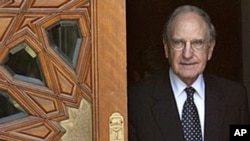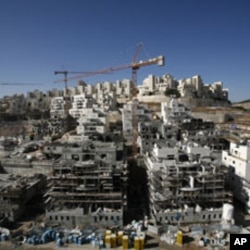The failure of the latest round of Middle East talks has left politicians and analysts grappling over whether a peace agreement achievable in the near future. U.S. negotiator George Mitchell met separately with Israeli and Palestinian leaders this past week, saying the US remained committed to pursuing substantive talks.
Aaron David Miller, Public Policy Scholar at the Washington D.C.-based Woodrow Wilson Center for Public Policy, is a former State Department analyst and negotiator and the author of The Much Too Promised Land: America's Elusive Search for Arab-Israeli Peace. He told VOA reporter Cecily Hilleary that no matter what strategy the U.S. will attempt in coming months, the chances of "quick and easy progress" remain slim.
Miller: You have two basic problems. The first is an ownership problem. Neither the Israeli nor Palestinian leadership owns their own process. And until they do, until they are driven by prospects of pain and/or gain, to a situation where on the core issues - Jerusalem, borders, security and refugees - they’re prepared to make the kinds of decisions, choices and concessions, it strikes me that we’re going to be wheel-spinning.
The second problem is the absence or lack of American credibility. I mean, these days, over the last several years, it seems that everybody says “no” to the United States without much cost and without much consequence, and a mediator really - an effective mediator - needs “street credibility,” needs the respect and even the fear, at some point, of the powers with which it deals.
So I think that this is going to be a very long “movie.” I think that the [U.S.] administration’s approach is worth the effort right now, which is to conduct parallel talks on these big issues to see where the gaps are, what each side may be willing to do, and then consider if the gaps can be bridged. That’s our assessment. But all of that, it strikes me, is going to be very, very hard.
And in the meantime, the Israelis will continue to pursue their settlement policies, and the Palestinians are involved in another major distraction, which is the effort to create the basis for what might be – although it’s highly inadvisable - a unilateral declaration of Palestinian statehood.
Hilleary: Let me jump back. You say that the United States isn’t credible, that it needs to be tough and inspire fear. What could it have done in this latest round of talks that it did not do?
Miller: Well, let’s first of all determine what it shouldn’t have done. It shouldn’t have identified a goal - a comprehensive freeze on settlements, including Jerusalem - that no Israeli government could ever have accepted. And then when it became quite clear that no Israeli government was going to accept it, then either threaten and/or try to bribe the Israelis into delivering a freeze. The whole policy of focusing on a settlement freeze is doomed.
Hilleary: From the Palestinian perspective, though, that was the condition for resuming direct talks.
Miller: That’s true, but direct talks, frankly, are of limited utility. If you went back and looked at the record of American mediation over the last 40 years, what you’d find is that our successes - and there have only been three: Kissinger’s disengagement diplomacy in the '70s, Jimmy Carter’s Egyptian-Israeli peace treaty, Jim Baker’s efforts to put together a Madrid Peace Conference - these all came as a consequence not of direct negotiations, but of U.S. mediation - indirect talks.
So, the issue is not direct or indirect. The issue is whether or not the parties, the Israelis and the Palestinians, Benjamin Netanyahu and Mahmoud Abbas, are prepared to make the kinds of choices that narrow the gaps sufficiently on the four core issues, which would allow a determined and smart American mediator to bridge those gaps.
And the answer to the first question so far, after 20 months, is “No, they’re not.”
The answer to the second question on the issue of U.S. mediation is a question mark.
But given the performance over the course of the last 20 months, a case can be made that the Americans aren’t up to it.






